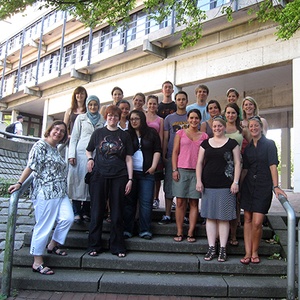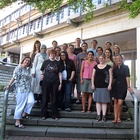I teach American Studies at the University of Wuppertal. Our school is located in a post-industrial area near Cologne, Germany, and many of our students aspire to become English teachers. One topic about American culture and society which proves particularly interesting to my students is ethnicity. This has become an especially important topic in our society which for a long time claimed to be mono-ethnic and denied different ethnic diversity of its own citizens. In the summer term of 2010 I decided to offer a course on Japanese American literature for undergraduate students for the first time, and about 20 students, also from different ethnic backgrrounds, signed up for it.
The history and literature of this group is quite distinct from other ethnic groups in America, and the low profile of Japanese American authors stands in stark contrast with the quality of their interesting contributions to American literature.
We read about Japanese immigration starting with the time of the Meiji Restoration, learned about the Gentleman’s Agreement, and living conditions on the West Coast in the twentieth century. We covered different text types, from the memoir by Etsu Sugimoto of 1927 to short stories by Toshio Mori and Hisaye Yamamoto of the 1940s and the graphic novel by Miné Okubo, to the novel No-No Boy by John Okada of the 1950s, and a play by the contemporary playwright Hiroshi Kashiwagi. The issues of these texts such as immigration, ethnicity, and racism appear in a similar albeit different context in German society. Time and again comparisons between the fate of German Jews and Japanese Americans came up in class discussions. Even though such historical comparisons are inherently problematic, they served as good touchstones to understand also the differences between American and German society in the 1940s. And they serve as a reminder that texts often are about the kind of choices people make under specific circumstances.
It was a wonderful experience to discuss these most interesting texts with the students in our class. As you can see from the responses, we all feel that these are outstanding texts which deserve more attention, by German, American and other international readers alike. I am confident that the values of a truly democratic education that were instilled by these texts will shape our students’ perspective and the next generation’s once they have become teachers themselves.
© 2010 Bettina Hofmann




